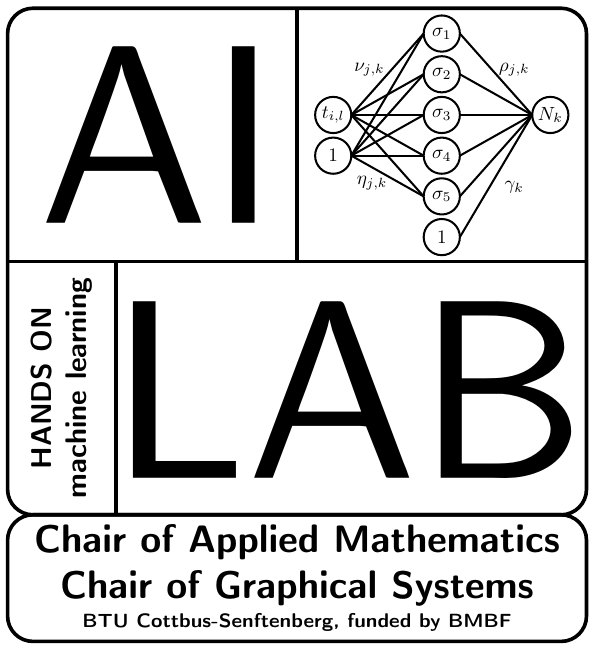
Laboratory management
Dr. Toni Schneidereit
Project management
Prof. Dr. Michael Breuß
Prof. Dr. Douglas Cunningham
With the AI-Lab, we have been creating a space for AI-related teaching and research at the BTU Cottbus-Senftenberg since 2022. In particular for the supervision of theses (B.Sc./M.Sc.) and internships. We employ student assistants for ongoing research projects, which mainly focus on explainable AI in object detection, object tracking, data generation and the solution of differential equations with neural networks. We also offer graduating students with good theses to work together to achieve a publication in form of a conference proceedings or a journal paper.
Equipment
- several high-performance AI workstations
- various lesser powerful computer devices
- a Fischertechnik teaching factory
- two 3D printers
- several wheeled drones (RoboMaster EP/S1)
- several flying drones (RoboMaster TT)
- cameras, microphones and light sources
The AI learning lab is part of the KI@MINT project funded by the Federal Ministry of Education and Research.
Thesis topics (selection/directions)
- Programming the wheeled drones (Bachelor/Master)
- Control of the learning factory based on object detection (Bachlor/Master)
- Detection of process faults in the learning factory (Master)
- Communication wheeled/flying drone (Master)
- Augmentation techniques for training data sets (Bachelor)
- Investigation of object tracking methods (Master)
- Image classification on computers of different power (Bachelor/Master)
- 3D reconstruction with AI (Master)
- Research questions on solving differential equation with AI (Bachelor/Master)
- Reinforcement-Learning in Blender/Unreal (Master)
- Image generation for dataset extension with GANs (Master)
- Explainable AI with, e.g., heatmaps (Master)
- Further topics on request
Journal-, Conference and Preprint-Papers
S. Humagain, T. Schneidereit (2025): Strategies for training point distributions in physics-informed neural networks. arXiv preprint. https://www.arxiv.org/abs/2508.13216
T. Schneidereit, S. Gohrenz, M. Breuß (2025): Object detection characteristics in a learning factory environment using YOLOv8. Intelligent Systems and Applications. IntelliSys 2025. Springer Lecture Notes in Networks and Systems, 1567, pp. 288-308. Best Paper Award. https://doi.org/10.1007/978-3-032-00071-2_18
S. Zell, T. Schneidereit, A. Fügenschuh, M. Breuß (2024): Advanced search and rescue operations for drowning swimmers using autonomous unmanned aircraft systems: location optimization, flight trajectory planning and image-based localization. Cottbus Mathematical preprints. https://doi.org/10.26127/BTUOpen-6866
M. Khan Mohammadi, T. Schneidereit, A. Mansouri Yarahmadi, M. Breuß (2024): Investigating training datasets of real and synthetic images for swimmer localisation with YOLO. MDPI AI, 5, pp. 576-593. https://doi.org/10.3390/ai5020030
S. Schneidereit, A. Mansouri Yarahmadi, T. Schneidereit, M. Breuß, M. Gebauer (2024): YOLO-based Object Detection in Industry 4.0 Fischertechnik Model Environment. Intelligent Systems and Applications. Lecture Notes in Networks and Systems, 823, pp. 1-20. doi.org/10.1007/978-3-031-47724-9_1
T. Schneidereit, M. Breuß (2023): Adaptive neural-domain refinement for solving time-dependent differential equations. Advances in Continuous and Discrete Models 2023, 42. doi.org/10.1186/s13662-023-03789-x
Successful theses
Moritz Krauth (study course artificial intelligence engineering)
Sparse Dictionary Learning für das Entrauschen von Bildern.
Master thesis, Brandenburg University of Technology, Germany, 2025.
[Supervised by the AI-Lab]
Lisa Albinus (study course economathematics)
KI-basierte Schwimmstilklassifikation aus Drohnenaufnahmen.
Bachelor thesis, Brandenburg University of Technology, Germany, 2025.
[Supervised by the AI-Lab]
Krishna Dave (study course artificial intelligence)
Exploration of Projected Gradient Descent for Diffusion based Image Generation.
Master thesis, Brandenburg University of Technology, Germany, 2025.
[Supported by the AI-Lab with feedback]
Santosh Humagain (study course physics)
Solving Differential Equations using Physics-Informed Neural Networks: Investigating Training Point Distributions.
Master thesis, Brandenburg University of Technology, Germany, 2025.
[Supervised by the AI-Lab]
Parth Bhardwaj (study course artificial intelligence)
Multi-Matrix Markov Chains for Polyphonic Music Generation.
Master thesis, Brandenburg University of Technology, Germany, 2025.
[Supported by the AI-Lab with feedback]
Cecil Joseph (study course artificial intelligence)
Evaluating reinforcement learning algorithms for UAV navigation in diverse simulated environments.
Master thesis, Brandenburg University of Technology, Germany, 2025.
[Supported by the AI-Lab with feedback]
Pacilia C. Abanda (study course artificial intelligence)
Fine-tuning a stable diffusion model to enhance control over furniture image generation.
Master thesis, Brandenburg University of Technology, Germany, 2025.
[Supported by the AI-Lab with feedback and GPU computation time]
Stefan Gohrenz (study course mechanical engineering)
Systematic investigation of AI-based object detection of various materials in an Industry 4.0 model environment.
Master thesis, Brandenburg University of Technology, Germany, 2025.
[Supervised by the AI-Lab]
Johannes Höna (study course artificial intelligence technology)
AI-based object recognition with YOLO of plastid clusters in fluorescence microscopy
Master thesis, Brandenburg University of Technology, Germany, 2025.
[Supervised by the AI-Lab]
Alexander Howel (study course computer science)
Drone detection and drone following with the Robomaster EP..
Bachelor thesis, Brandenburg University of Technology, Germany, 2025.
[Supervised by the AI-Lab]
Patrick Ebert (study course computer science)
Reduction of process throughput time in a Fischertechnik modelfactory.
Bachelor thesis, Brandenburg University of Technology, Germany, 2025.
[Supervised by the AI-Lab]
Dustin Scharf (study course computer science)
A draft for the implementation of a practical course on Transformer Networks.
Bachelor thesis, Brandenburg University of Technology, Germany, 2024.
[Supervised by the AI-Lab]
Slavomíra Schneidereit (study course mechanical engineering)
Investigation of object recognition with neural networks using YOLO models in a learning factory.
Master thesis, Brandenburg University of Technology, Germany, 2022.
[Supervised by the AI-Lab]
